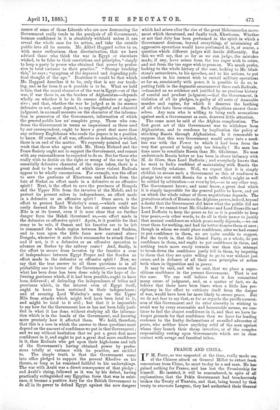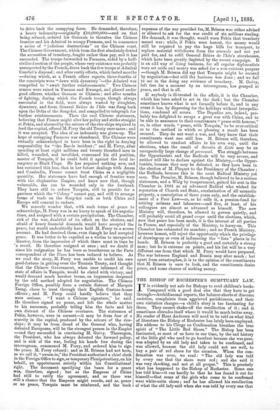FRANCE AND CHINA.
IF M. Ferry, as was suspected at the time, really made use of the Chinese attack on General Millot to extort fresh concessions from China, he must to-day be a sad man. He has gained nothing for France, and has lost the Premiership for himself. He insisted, it will be remembered, in spite of all explanations, that the Pekin Government had treacherously broken the Treaty of Tientsin, and that, being bound by that treaty to evacuate Langton, they had authorised their General to drive back the occupying force. He demanded, therefore, a heavy indemnity—originally £10,000,000—and on that being refused, ordered his Generals to threaten the Chinese frontier and his Admiral to occupy Formosa, and to commence a series of " judicious destructions " on the Chinese coast. The Chinese Government, which from the first absolutely denied the accusation of treachery, fought rather than pay, and it has succeeded. The troops forwarded to Formosa, aided by a halfcivilised section of the people, whose very existence was probably unsuspected by the French, drove back the few troops at Admiral Courbet's disposal ; and after costly efforts, which lasted months —during which, as a French officer reports, three-fourths of the conscripts were " down with dysentery "—the Admiral was compelled to " await further reinforcements." Two Chinese armies were raised in Yunnan and Kwangsi, and placed under good officers, whether German or Chinese ; and after months of fighting, during which the French troops, though always successful in the field, were always wasted by slaughter, dysentery, and fever, General Briere de 'Isle was flung back upon the Delta of the Song-koi, and compelled to telegraph for further reinforcements. Then the cool Chinese statesmen, believing that France might alter her policy and strike straight at Pekin, and alarmed by the seizure of the rice-ships required to feed the capital, offered M. Ferry the old Treaty once more ; and it was accepted. The idea of an indemnity was given-up. The hope of occupying Formosa was abandoned. The Chinese were virtually acknowledged to have been in the right in denying responsibility for " the Bac-le incident ;" and M. Ferry, after spending at least eight millions and twenty thousand men in killed, wounded, and invalided, reassumed his old position, master of Tonquin, if he could hold it against the local insurgents or Black Flags. He has acquired nothing new, and has sustained this loss, that in her future dealings with Anam and Cambodia, France cannot treat China as a negligible quantity. Her statesmen have had enough of frontier wars with the elephantine Empire, and know now that, though vulnerable, she can be wounded only in the forehead. They have still to reduce Tonquin, still to provide for a garrison which the " Colony " cannot pay, and still to arrange terms of trade on the Song-koi such as both China and Europe will consent to endure.
We scarcely wonder that, with such terms of peace to acknowledge, M. Ferry was in no hurry to speak of his negotiations, and resigned with a certain precipitation. The Chamber, sick of the war, doubtful of its effect on the electors, and afraid of heavy financial demands, would have accepted the peace, but would undoubtedly have held M. Ferry to a severe account. He had deceived them, even though he had accepted peace. It was better to be expelled as a victim to unexpected disaster, from the impression of which there must in time be a recoil. He therefore resigned at once ; and we doubt if since his resignation he has been so treacherous as the Paris correspondent of the Times has been induced to believe. As we read the story, M. Ferry was unable to credit his own good-fortune in getting even the Tientsin Treaty, and thought that the Chinese Government, when once informed of the state of affairs in Tonquin, would be elated with victory, and would demand much harsher terms, an impression deepened by the odd method adopted for negotiation. The Chinese Foreign Office, possibly from a certain distrust of Marquis Tseng, chose to treat through their English Custom-house officers ; and M. Ferry could hardly believe that they were serious. "I want a Chinese signature," he said. He therefore signed no peace, and left the whole matter to his successor, probably telling him the facts and his own distrust of the Chinese overtures. The statesmen of Pekin, however, were in earnest—it may be from fear of a scarcity in the capital, produced by the seizure of the riceships ; it may be from dread of the General who, having defeated Europeans, will be the strongest person in the Empire —and they succeeded in convincing M. Grevy. Thereupon, the President, who has always detested the forward policy, and is sick of the war, feeling his hands free during the interregnum, summoned M. Ferry, and ordered him to sign the peace. M. Ferry refused ; and as M. Brisson had not been, as we call it, " sworn-in," the President authorised a chief clerk in the Foreign Office to sign,as temporary Plenipotentiary, on his behalf, an appointment strictly within his Constitutional right. The document specifying the bases for a peace was, therefore, signed ; but as the Empress of China had still to ratify the agreement, and as there was still a chance that the Empress might recede, and as, peace or no peace, Tonquin must be reinforced, and the back expenses of the war provided for, M. Brisson was either advised or allowed to ask for the war credit of six millions sterling. His demand, it was thought, would warn Pekin that treachery meant war ; while, if Pekin were honest, the money would still be required to -pay the huge bills for transport, to replace material withdrawn from the arsenals and not yet paid for, and to refill General Briere de ''Isle's storehouses, which have been greatly depleted by the recent campaign. It is an odd way of doing business, for all regular diplomatists were set aside and money was asked for a non-existent purpose —though M. Brisson did say that Tonquin might be secured by negotiation—but still the business was done ; and we fail to see in the doing any evidence of treachery. M. Grevy, left free for a moment by an interregnum, has grasped at peace, and that is all.
If anybody is ill-treated in the affair, it is the Chamber, which has been asked to act in the dark ; but the Chamber sometimes knows what is not formally before it, and in any event it has, by dispersing for the holidays without interpellations, condoned all errors. The Deputies are, indeed, pro bably too delighted to escape a great war with China, and to be able to announce to their constituents " peace with honour," or, in other words, " peace, with Tonquin," to be over-critical as to the method in which so pleasing a result has been secured. They do not want a war, and they know that their constituents want one still less. M. Brisson will, therefore, be allowed to conduct affairs in his 'own way, until the elections, when the result of Scrutin de Lists may be an unexpectedly large change of personnel. The struggle between the Opportunists and the Radicals will be very severe, and neither will like to declare against the Ministry,—the Opportunists, because they may be defeated, as they have been in the election of M. Floquet to the Presidency of the Chamber ; the Radicals, because this is the most Radical Ministry yet seen. The Premier, M. Brisson, though believed to be .a serious statesman, and a Whig by temperament, gained his seat in the Chamber in 1881 as an advanced Radical who wished for separation of Church and State, secularisation of all monastic property, a conscription of three years only, and the establishment of a Poor Law—or, as he calls it, a pension-fund for retiring artisans and labourers—and five, at least, of his colleagues are almost as advanced as himself. The new Ministry will, therefore, be allowed to govern quietly, and will probably avoid all grand coups until the elections, which, now that peace has been made, it is the interest of all parties in France, and especially of the Ministry, to hurry-on. This Chamber has exhausted its mandate ; and no French Ministry, however honest, will reject the opportunity which the privilege of drawing-up or even of influencing the lists " places in its hands. M. Brisson is probably a good and certainly a strong man ; but he is extreme on points, and his list will be a very different one from that which M. Ferry would have prepared. The war between England and Russia may alter much ; but apart from catastrophes, it is to the opinion of the constituents that M. Brisson is sure to look, and the constituents desire peace, and some chance of making money.



































 Previous page
Previous page